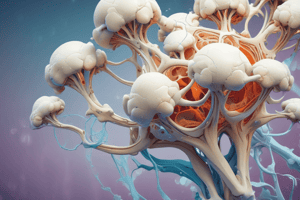Podcast
Questions and Answers
What happens to osteoblasts that secrete osteoid?
What happens to osteoblasts that secrete osteoid?
- They transform directly into osteoclasts.
- They continue to proliferate indefinitely.
- They undergo apoptosis. (correct)
- They become osteocytes only.
What is the initial step in bone mineralization involving osteoblasts?
What is the initial step in bone mineralization involving osteoblasts?
- Secretion of osteoprotegerin.
- Apoptosis of inactive progenitor cells.
- Deposition of osteoid. (correct)
- Formation of osteocalcin.
What are the cells called that are located within lacunae surrounded by bony matrix?
What are the cells called that are located within lacunae surrounded by bony matrix?
- Osteoclasts.
- Lining cells.
- Osteocytes. (correct)
- Osteoblasts.
What is the composition of the mineral crystals that are formed during bone mineralization?
What is the composition of the mineral crystals that are formed during bone mineralization?
What substance secreted by osteoblasts plays a critical role in binding calcium ions?
What substance secreted by osteoblasts plays a critical role in binding calcium ions?
Which process is NOT mentioned as part of bone appositional growth?
Which process is NOT mentioned as part of bone appositional growth?
What is a unique characteristic of primary bone tumors?
What is a unique characteristic of primary bone tumors?
During the process of matrix mineralization, which of the following occurs?
During the process of matrix mineralization, which of the following occurs?
What is the primary function of the sealing zone formed by the membrane domain of an active osteoclast?
What is the primary function of the sealing zone formed by the membrane domain of an active osteoclast?
Which type of collagen predominantly makes up the outer fibrous layer of the periosteum?
Which type of collagen predominantly makes up the outer fibrous layer of the periosteum?
What role do osteoprogenitor cells play in the bone structure?
What role do osteoprogenitor cells play in the bone structure?
What promotes the local signaling for the activation of osteoclasts?
What promotes the local signaling for the activation of osteoclasts?
What happens to hydroxyapatite as a result of the acidification process in the osteoclast’s microenvironment?
What happens to hydroxyapatite as a result of the acidification process in the osteoclast’s microenvironment?
Which of the following is TRUE about the endosteum?
Which of the following is TRUE about the endosteum?
What is a significant characteristic of perforating (Sharpey) fibers?
What is a significant characteristic of perforating (Sharpey) fibers?
In osteopetrosis, which of the following is primarily disrupted?
In osteopetrosis, which of the following is primarily disrupted?
What is the primary mechanism for raising blood calcium levels?
What is the primary mechanism for raising blood calcium levels?
Which type of bone replaces the immature woven bone of the callus during remodeling?
Which type of bone replaces the immature woven bone of the callus during remodeling?
During appositional growth, new bone tissue is added to which surface of the bone?
During appositional growth, new bone tissue is added to which surface of the bone?
What is the result of bone remodeling during the healing process?
What is the result of bone remodeling during the healing process?
What type of growth refers to the formation of the bone collar during endochondral ossification?
What type of growth refers to the formation of the bone collar during endochondral ossification?
How is calcium mobilization primarily regulated?
How is calcium mobilization primarily regulated?
Which of the following describes a characteristic of cancellous bone?
Which of the following describes a characteristic of cancellous bone?
In what phase of life does the process of radial bone growth primarily occur?
In what phase of life does the process of radial bone growth primarily occur?
What distinguishes woven bone from lamellar bone?
What distinguishes woven bone from lamellar bone?
What is the significance of tetracycline in bone studies?
What is the significance of tetracycline in bone studies?
In healthy adults, what percentage of bone is typically turned over annually?
In healthy adults, what percentage of bone is typically turned over annually?
What characteristic is associated with woven bone during embryonic development?
What characteristic is associated with woven bone during embryonic development?
Which feature is true regarding woven bone?
Which feature is true regarding woven bone?
What happens to woven bone after it forms in adults?
What happens to woven bone after it forms in adults?
The cycle of osteoid secretion in osteoblasts results in what structure in bones?
The cycle of osteoid secretion in osteoblasts results in what structure in bones?
What happens to woven bone during fracture repair?
What happens to woven bone during fracture repair?
What is the primary function of the nucleus pulposus in an intervertebral disc?
What is the primary function of the nucleus pulposus in an intervertebral disc?
What occurs most frequently in the posterior region of the intervertebral disc?
What occurs most frequently in the posterior region of the intervertebral disc?
Which of the following characteristics best describes the annulus fibrosus?
Which of the following characteristics best describes the annulus fibrosus?
What happens to the nucleus pulposus as an individual ages?
What happens to the nucleus pulposus as an individual ages?
What type of joint allows for free bone movement, as described in the content?
What type of joint allows for free bone movement, as described in the content?
What consequence can result from a herniated disc compressing adjacent nerve fibers?
What consequence can result from a herniated disc compressing adjacent nerve fibers?
Which cellular component is primarily responsible for the viscosity of the nucleus pulposus?
Which cellular component is primarily responsible for the viscosity of the nucleus pulposus?
What structural feature contributes to the toughness of the intervertebral disc?
What structural feature contributes to the toughness of the intervertebral disc?
Flashcards are hidden until you start studying
Study Notes
Bone Development and Cell Types
- Osteoblasts, responsible for bone formation, secrete osteoid and can differentiate into osteocytes or undergo apoptosis.
- Active osteoblasts appear rounded, while osteocytes are flattened and located in lacunae within the bone matrix.
- Bone appositional growth involves the secretion of osteoid between the osteoblast layer and existing bone surface, initiating the calcification process.
- Calcium salts are deposited into the newly formed matrix, embedding collagen fibers and proteoglycans.
- Osteocalcin, a vitamin K-dependent protein, is secreted by osteoblasts to bind calcium ions, aiding in mineralization.
Osteoclast Function
- Osteoclasts form a specialized microenvironment for bone resorption through a sealing zone and a ruffled border.
- These cells pump protons into the area to acidify and dissolve hydroxyapatite, utilizing metalloproteinases for matrix protein digestion.
- Osteoclast activity is regulated by osteoblasts through signaling factors including M-CSF and RANKL, which promote osteoclast formation and activity.
Bone Structure
- The periosteum covers the outer surface of bones while the endosteum lines the internal surfaces; both are composed of connective tissue.
- The outer periosteum contains dense connective tissue, type I collagen, fibroblasts, and blood vessels, while the inner layer includes osteoblasts, bone lining cells, and osteoprogenitor cells.
- Small trabeculae of bony matrix exist in the endosteum, projecting into marrow cavities.
Woven and Lamellar Bone
- Woven bone is nonlamellar, characterized by irregularly arranged collagen fibers, appearing first in embryonic development and fracture repair; typically replaced by lamellar bone in adults.
- Woven bone has lower mineral content and is more easily penetrated by X-rays than mature lamellar bone, which has a higher strength.
- Tetracycline can be used to measure bone growth by binding to newly deposited osteoid during mineralization.
Bone Remodeling
- Blood calcium levels are maintained by mobilizing calcium ions from hydroxyapatite within cancellous bone, regulated by paracrine signals from bone cells.
- Bone changes in diameter through appositional growth, forming new tissue beneath the periosteum while resorbing bone at the endosteal surface.
Intervertebral Discs
- Intervertebral discs consist of an outer annulus fibrosus made of concentric fibrocartilage laminae and an inner nucleus pulposus providing shock absorption.
- Nucleus pulposus contains a viscous matrix and vacuolated cells, decreasing in size with age and partially replaced by fibrocartilage.
- Herniated discs occur due to degeneration of the annulus fibrosus, often compressing nearby nerves and causing pain.
Synovial Joints
- Diarthroses (synovial joints) allow significant mobility, connecting long bones with flexibility; examples include elbow and knee joints.
Studying That Suits You
Use AI to generate personalized quizzes and flashcards to suit your learning preferences.




